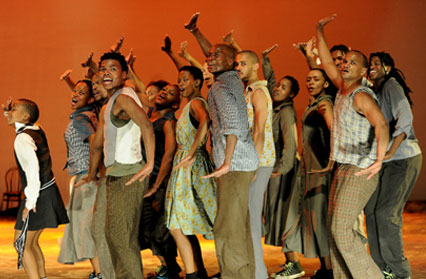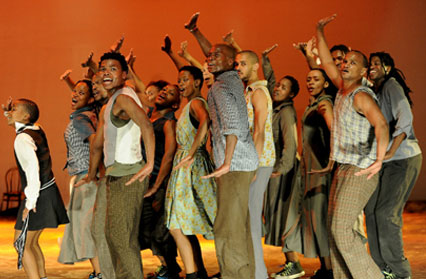Biko’s Quest: Jazzart Dance Theatre & Artscape Theatre
Chapter Arts Centre / Taliesin Arts Centre – Afrovibes
Directed by Mandla Mbothwe
Choreographed by: Jackie Manyaapelo, Mza Gasa, Ina Wichterich

A black teenage schoolgirl sits at a desk voicing the words of anti-apartheid campaigner and ‘Black Consciousness’ thinker Steve Biko, which she accompanies with the percussive insistence of a typewriter. The flow of political rhetoric and the rhythms of dance form the soundscape of Biko’s Quest, an exploration of collective memory, racial identity and national history from Jazzart Dance Theatre that is, at turns, celebratory and mournful, but always compelling. The lone voice of Biko soon gives way to the raucous sounds of a township party in which the idioms of traditional South African dance comingle with those of modern jazz, lindy-hop and contemporary ballet. Biko’s famous and frequent iteration that ‘black is beautiful’ is here given vivid physical expression by a cast of ten dancer-actors, who show how the people of Soweto were once able to find some form of brief albeit limited freedom, even in the face of brutal oppression, through the joy of dance.
The dancing of the Jazzart ensemble in this early township scene is vibrant and fun, but it is the clarity and emotive force of their storytelling through physical theatre techniques that is their most impressive achievement. A township raid by apartheid-enforcing state police is evoked powerfully by torchlight beams piercing through stage fog and by the stylized movements of the cast who simulate the pained reactions of the body to truncheon blows and bullets ripping through flesh. Such vivid theatricality provides an urgent context for the words of Steve Biko, whose speeches and writings are quoted throughout.
The Afrovibes Festival is marking the 20th anniversary of the end of the apartheid regime in South Africa, and the election of Nelson Mandela as president, with a tour of plays and musical performances across the United Kingdom. Theatre was often a potent educational tool and means of protest employed by artists and activists in the anti-apartheid struggle. The Island and Sizwe Banzi is Dead – created by Athol Fugard, John Kani and Winston Ntshona – are just two examples of plays indicting the oppressive racism of apartheid that have become classics of global anti-authoritarian theatre. Kani and Ntshona were arrested for their politicised dramas, and several of Fugard’s plays were banned. Likewise, Biko’s writings were banned and he was often arrested, although in his case he was finally murdered by South African police whilst in their custody. Biko’s Quest therefore not only gives Welsh audiences the opportunity to enjoy South African music and dance, it also provides us with a sense of the danger and searing political anger that charged much of the theatre of South Africa from the time of the Sharpeville Massacre in 1960 right up until the present day. Indeed Jazzart Dance Theatre, which has been in existence since 1973, frequently staged anti-apartheid performances through the various ‘states of emergencies’ declared by former President P.W. Botha during the 1980s.
Biko’s Quest is about much more than anger and defiance – even though the apartheid authorities’ policies of torture and murder of political prisoners are graphically represented throughout – it is the intellectual clear-sightedness and deep humanity of Steve Biko that lies at the core of this compassionate and ultimately uplifting piece of theatre. For Biko, the anti-apartheid struggle was not about ‘anti-white’ hatred, his aim was always to secure the mental emancipation of the ‘black man’ from the value systems of white society that sought ‘to make him a foreigner in the country of his birth and reduce his basic human dignity’.
The performance ended with a hushed and intensely moving salute from a cast of talented young, black South Africans to one of their great historical figures. Biko’s absence was indicated by an empty chair at a desk with a silent typewriter. Jazzart Dance Theatre succeeds in achieving something quite extraordinary in Biko’s Quest, they fuse political thought with dance and physical gestures, employing one to inform the other. In doing so, they prove that political theatre does not have to consist of dull and worthy agitprop, it can also be dynamic and thrilling. Sadly, there was only one performance of Biko’s Quest at Taliesin and Chapter, so regrettably only a small Welsh audience was able to witness just how thought can effectively challenge oppression and liberate even the most abject of citizens. Biko is quoted as proclaiming, ‘In time, we shall be in a position to bestow on South Africa the greatest possible gift – a more human face’. That ‘more human face’ was visible at Chapter on October 25th and that was a consoling conclusion to Biko’s quest.











